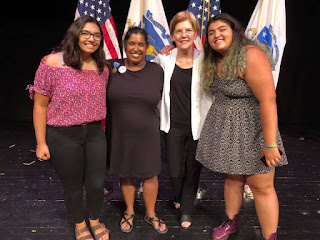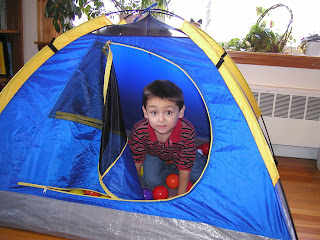I am not an adoption blogger. I have not strived to be a human being who dissects her life based on my first seven months of life, the cumulative effects of those, and existing as an international adoptee. In retrospect, I've not given them the roles they deserve by acknowledging how they have shaped my life as a whole. It's never been forefront in my thoughts beyond what I think are the typical loss and abandonment stuff most adoptees probably think about when they are feeling down. Yet, now, I see my adoption as a puzzle, one which affects so many differences pieces of my existence, my thought processes, my values, and my parenting.
In addition, life parenting a child with autism and parenting in general, along with a slew of other joys and challenges, has certainly been enough to occupy my little part of the blogosphere.
I was given up. For good or for bad. It is what it is. The first experience in my life is that I was given away. The good is I found my way to Mother Teresa's orphanage in Kanpur, India. I don't know anything about it, but I'd like to imagine it was a place where babies were held and played with, not where they were kept in their cribs 23 hours a day, the only toys ones hung on the wall. (My adopted sister lived in *that* kind of orphanage, as did kids I work with now). I have this fantasy that nurturing women, likely nuns, held me when I cried, played peek-a-boo, laughed when I made a funny face, or tried their dardnest to make me laugh when I was on the verge of tears.
What I also DO know is my given name: Shantini. Folklore says this is the name my birth mother chose. (My adoptive parents kept it as my middle name).
I also know one more fact: I arrived here as a baby, adopted by white parents into what was then a *very* white community. This leads me to say with certainty: I am the whitest brown person you will ever meet.
 |
| Naturalization Day... clearly I was impressed. |
|
Sure, there were the Indian meals my adoptive mother tried to make, the Indian dance recitals and cultural festivals we went to, and the one or two sets of Indian or 1/2 Indian/1/2 American couples my parents knew and we socialized with. I once was given a sari- I think someone once helped me put it on. I loved to watch my friend S perform beautiful, classical Indian dancing.
But, I never went to "Indian School" like all the other Indian kids did. I was disconnected from the culture. For this good reason, it's still quite foreign to me.
There were definitely attachment issues at play. With my adoptive parents, with extended family, then with men I dated, and finally, as a mother. In a nutshell, it's hard to trust when you've been abandoned once (and I can't go to that "happy place" of "Isn't it wonderful your birth mother gave you up and brought you where she did?").
It's why relationships with my children, and parents, require a lot more effort - and skills I even need to work on. Trusting someone is going to be there, as the child or the parent, when you been through abandonment is not something I'd wish upon anyone as it's a challenge. My children mean the world to me, but this "tween/teen" thing may just do me in in a quicker, more stabbing fashion than autism.
Then, there's dating. It's amazing I got married and had these beautiful children. I trusted that vow was forever and no one was going to leave or "check out" of the marriage. It's awful to think, more or less write, but sometimes I wonder if I got married because someone loved me unconditionally. Me, this not-so-attractive brown person in a very white world, was worthy to a few people.
And then, there was me. A caretaker by nature, someone who not only loved being part of a family, be it a home unit or a church family. I truly enjoyed my female friendships; what I gave to and got from them.
Then, my marriage ended, along with the "happily-ever-after", something we both hold responsibility for.
So, what did I do? I got involved with someone just as lonely as I was, even for similar reasons. He had the same personality and make-up of my husband. Both very nurtured and loved by their (biological) parents, there were no abandonment issues with either of these men. I again fell, willingly, into that warm, enveloping feeling of being loved and taken care of. I don't know how that feels for anyone else, but for me, someone who had been abandoned, it was the safest feeling *ever*. Forget the physical and emotional attraction and/or compatibilities, I was with someone who did the opposite of abandon me. He protected me and said he was never going to leave.
Well, that fairy-tale didn't have a "happy ever after ending", either. (You know, Patrick Dempsey in Ever, Ever After is just a nice, juicy fantasy). What I may have correctly originally perceived as care and commitment I believe was real. What ended up just as real was a lot of control towards me. I was used to being in control; I was running a household of four young children. I was not used to being controlled. And I was *petrified* of being abandoned again. It was like turning into that scared little girl I must have been at some point. Yet, I was a grown-up, with children to raise and other people's children to help care for. For these moments of joy with him, and many moments of joy with all the kids, there was this insecure piece of my heart which didn't want to be broken, no matter the cost to my person.
So, being the responsible adult I was, I tried to juggle and exist in that "happy" role. Then, the facade started cracking. On Christmas Eve, kids away at church with another parent, the best birth control of a tubal ligation in place, I got pregnant. I ended up in the unenviable position of being the one to consider giving away a child, abandoning him or her. The other two choices (parenting or termination) were not real options those first few months. And then things went terribly wrong. The pregnancy ended in a way I won't ever write about here. That was another loss, alongside that relationship. Trust= absolutely shattered.
How much does being an adult adoptee filter into the lens I see parenting through? More than I thought. My children have their own stories to tell, different from mine in many ways, and they've experienced a different type of loss: divorce. What I strive for is to give them the reassurance they are loved unconditionally. (This doesn't always mean I or others like what they do, nor should it). But I will never choose to give up my child, or give up on my child.
My ex-husband taunts my core belief that it's important to me to have a village surrounding my family. Maybe he's right, as many in that village (I think of our long-term church family) simply disappeared after our less-than-harmonious divorce. Yet, my friends have gone off in different directions, too. I don't fit in to the "mommy" groups, married women who balance kids, typically hard-to-manage husbands, and households, if not work, too. I don't neatly fit into the "autism group" stereo-type as I am a strong believer that there is no vaccine-autism link, but I am also not a card-carrying member of the "neuro-diversity" club, either. The latter is because my son evidenced delays almost immediately after birth, the former because he is not high-functioning and I doubt will ever be able to speak about "Autism and What it Means to Me". Or even define it in an essay.
Ironically, my son is the one person on Earth I doubt will ever choose to abandon me. My daughters, collectively, resent him and what his autism has taken away from their lives. My ex-husband has never accepted him for who he is, and therefore can not manage to care for him for any extended period of time. Finally, that baby that never was born, who would have been born with genes from two parents who hold autism in our genes, lives in my heart.
I think about Mother Teresa often; more often I think about going back to India and visiting the orphanage. Yet, if it is not what I expect, that idealized image of care and joy ingrained in my soul non-existent, my heart would break. It would be easy to say "who cares" about any of this? The past is the past, that book has already been written. I can only someday write the chapters of the book that have yet been lived.
Living without an identity IS something I haven't thought about very much. But, upon reflection, it absolutely is something which contributes to the fibers of my soul, my thoughts, and my choices. As a woman. As a parent. As a partner. As a professional.
That is the truth. For some reason I can't pinpoint, simply writing about it makes it hurt a bit more. Writing about it, however, takes away a lot of the shame.
Author's note (7/21/13): There is quite a miraculous and intense footnote to this post. Thanks to social media, connections were made, one incredibly meaningful. I haven't processed this enough, and my thoughts are too jumbled to coherently write at this point Two final thoughts: 1. Never lose hope. 2. Miracles apparently do happen with one just finding its way into my life.


















